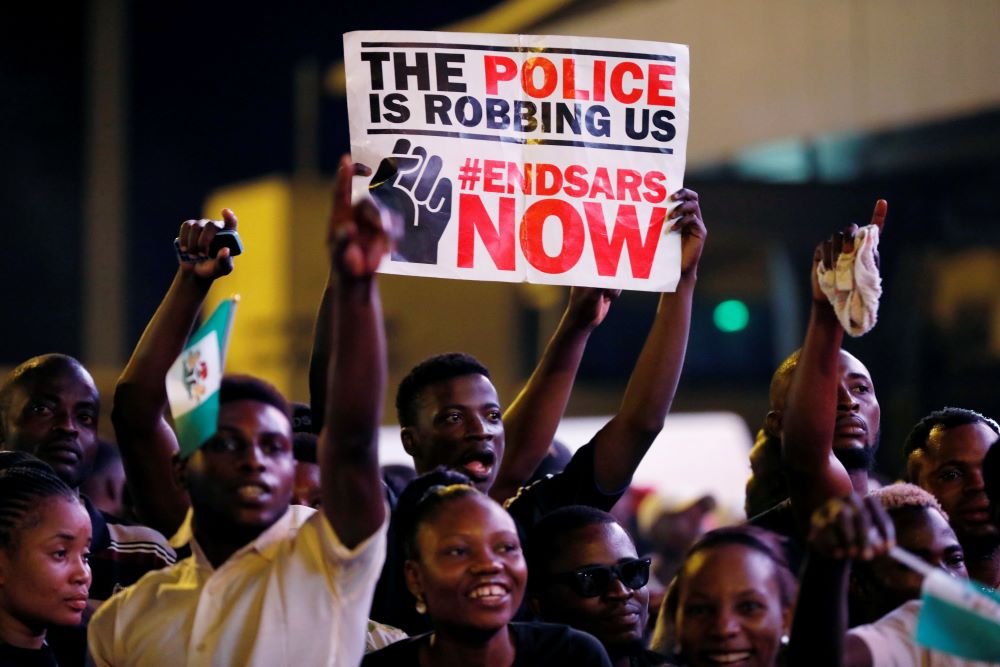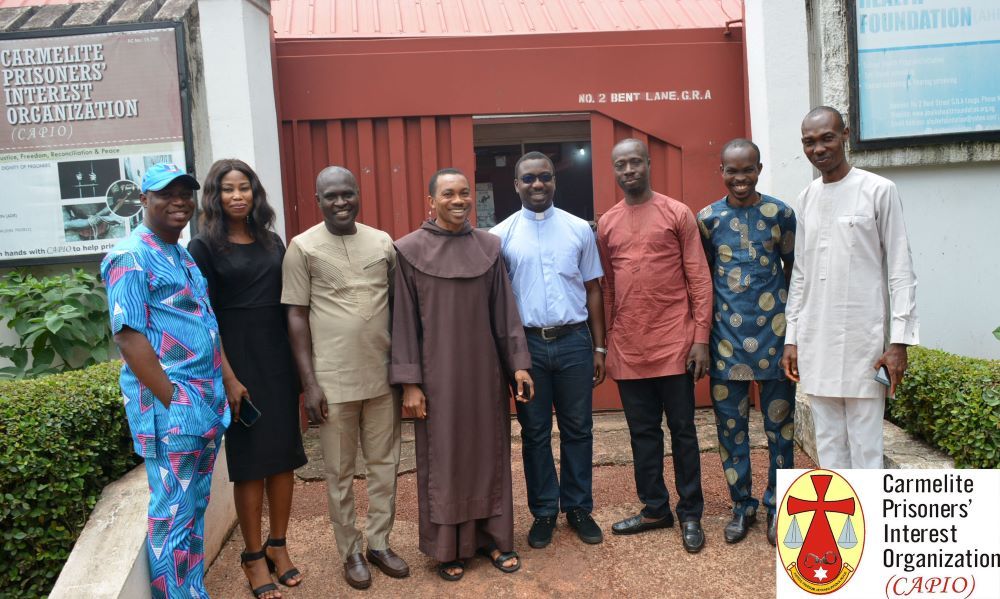
A demonstrator holds a sign during protest in Lagos, Nigeria, Oct. 17, 2020, over alleged police brutality by SARS, or Special Anti-Robbery Squad. The police unit, created in 1992, had long been accused of harassing and physically abusing civilians. It was disbanded in October 2020. (CNS photo/Reuters/Temilade Adelaja)
Lilian Otutu, now a business administration student, was arrested on suspicion of murder in September 2018 and was bundled off to a special anti-kidnapping squad jail, located just three miles from her home in Abakpa, in Enugu, Nigeria's southeastern state.
At the police unit, Otutu found that five others had been arrested in connection to the same alleged crime. The six spent more than 50 days in the unit's holding facility before their case was heard before the Enugu magistrate court.
"I was remanded in prison for an offense I know nothing about, and spent about one year awaiting trial," Otutu, 41, told NCR.
"One of my friends was accused of killing somebody. But unfortunately, about six of us were arrested in connection to the case, including my friend who allegedly killed the man," she said.
After a pause through 2020 because of COVID lockdowns, the trial against the six individuals resumed in 2021 until an intervention by the Carmelite Prisoners' Interest Organization, or Capio, a nonprofit committed to improving the welfare of inmates in Nigeria. By the time the organization got involved in Otutu's case, two of those charged had died in police custody.
Otutu and three others were later discharged and acquitted in February 2022. "We were told by the judge that we have no case to answer," Otutu said.
Since 1992 the Carmelite Prisoners' Interest Organization, or Capio, has responded to inmates' practical and material needs while pushing for criminal justice reform in Nigeria.

Carmelite Fr. Jude Isiguzo, Capio's executive director (right), meets with Joseph Usifo, deputy controller of Enugu Correctional Center. Capio is a nonprofit committed to improving the welfare of inmates in Nigeria. (Courtesy of Chukwuanu Okoli, Communication Officer, Capio)
Since it launched in 1992 by Discalced Carmelite friars in Enugu, the prisoners' advocacy organization has responded to inmates' practical and material needs while pushing for criminal justice reform in Nigeria.
The Catholic group says it has secured the release of more than 100 inmates and intervened in more than 1,000 situations involving attempted extortion by police or judicial officials.
Capio is one of many such nonprofits that have organized in recent years, as lawyers and activists seek to counter a notoriously corrupt, slow and violent judicial system.
Much of Nigeria's prison population serves time without being sentenced. A 2017 report from Nigeria's National Bureau of Statistics suggests Nigerian prisons may hold more innocent people than guilty criminals. The report, covering 2011-15, estimated that 72.5% of Nigeria's total prison population are serving time while awaiting trial and without being sentenced.
The disbanded Special Anti-Robbery Squad, an arm of the Nigerian Police Force, which arrested Otutu, has faced particular scrutiny. The police unit is routinely accused of grave rights abuses, which sparked a nationwide protest against systematic police brutality and corruption in October 2020.
The police force was ranked the most corrupt Nigeria's government institution in the Socio-Economic Rights and Accountability Project's 2019 report.
Carmelite Fr. Jude Isiguzo, Capio's executive director, said a lot of irregularities and corruption exist in the Nigerian justice system.
"The problem is that poor people suffer a lot, they don't get access to justice and even when they do, they don't get it on time," he said in an interview. "It's like a place where justice exists only for the highest bidder because when you go to most police stations, you'd see people who are being incarcerated, 95% of them are poor people."
Capio works to gain release of people unlawfully detained. Isiguzo said most of the police do not follow the Administration of Criminal Justice Act of 2015, which "promotes efficient management of criminal justice institutions, speedy dispensation of justice, protection of the society from crimes and protection of the rights and interest of the suspect, the defendant and victims in Nigeria."
The 2020 Nigeria Police Act also calls for a more efficient police force and respect for suspects' human rights.
"When they make arrests, they do it just on their own without following the law, they delay charging alleged offenders to court because they want to extort them in the name of bail, and when the alleged offender fails to offer them money for bail, they'd charge him to court," Isiguzo told NCR.

Carmelite Fr. Jude Isiguzo during a courtesy visit by Emmanuel Kanikwu, officer in charge of Oji River Custodial Centre in Enugu state, Nigeria (Courtesy of Chukwuanu Okoli, Communication Officer, Capio)
In August 2019, President Muhammadu Buhari reformed the Nigerian Prisons Service, an agency that operates prisons and signed the Nigerian Correctional Service Bill into law. Part of the reform focuses on rehabilitating inmates through education and vocational training while they are in correctional centers. But implementation remains slow due to government funding shortfalls.
However, Capio's work is making a difference and enhancing access to justice.
During the COVID outbreak in Nigeria, the legal processes in many cases stalled. Capio, in partnership with Misean Cara, a Dublin-based nonprofit, pushed for virtual court hearings in correctional centers in Enugu state. The aim is for inmates to be able to attend their trials inside prison and clear the backlog of cases of people awaiting trial.
The group provided equipment like laptops, Wi-Fi routers and desks for detention centers in several Nigerian states.
Isiguzo and his team visit the prisons and provide support to people awaiting trial. They also celebrate Mass and provide legal representation, especially to those who have been abandoned by their relatives.
Advertisement
"Capio has improved the quality of life and outcomes for inmates and those released from correctional centers in Enugu," said Joseph Usifo, deputy controller of Enugu Correctional Center.
"Father Jude and his associates have really succeeded in helping indigent citizens in incarceration to have access to justice as supposed without paying a dime," Usifo told NCR.
"Since I took over this facility on June 24 last year, I have been working with Capio, and we have changed the pattern of how things are happening here," he said.
Otutu said after her release from the Enugu Correctional Center in February 2022, she experienced stigma from her friends and community.
Capio sponsored a trip for her to Abuja, Nigeria's capital city, for a skill acquisition program. They paid her room and board for a month to help her begin rebuilding her life.





